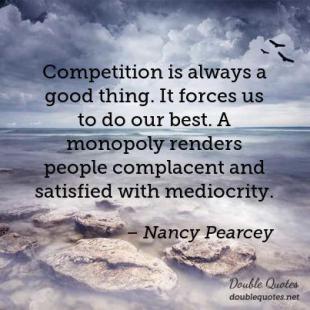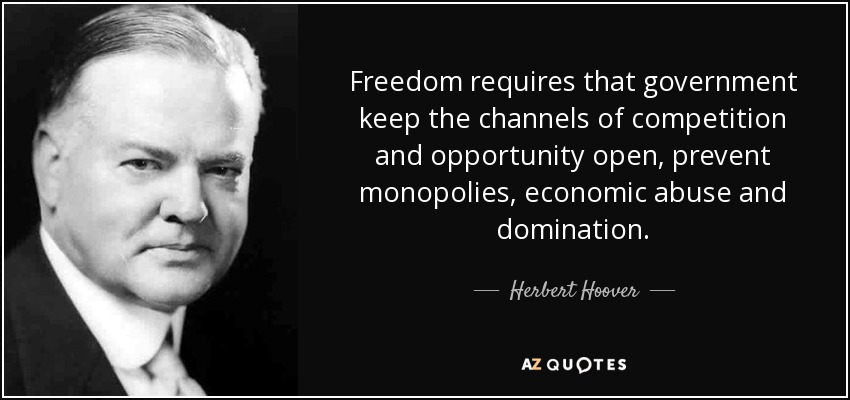Depending on the state of affairs, people love or hate these terms. An industrialist who has an monopoly over a particular trade would hate the term competition, whereas a customer would love it. A dictator or person in power would love monopoly and dislike opposition who would be advocates of competition. One of the rarest occasions where they come together is in the life of some great sportsmen and for whom competition brings the best in the them, helping them to establish their monopoly on a much authoritative way.
The life examples have shown that monopoly is not much helpful for pursuit of freedom and happiness. Most having a monopoly in power will try to curtail the freedom of others, especially the freedom to dissent or to have another point of view. It is a pity that human life violations are extreme in the case of most governments which are authoritarian. Even in democratic form of governments, some leaders are able to create a God-like image. That’s why many would say that a powerful opposition is equally important in a democracy.
 In the field of industry and market, there are attempts by different agents to capture the market. In many cases, one individual or industry have a monopoly in a business sector. Sometimes the money-power is used to crush the entry of new comers. We might say, the competition adopted is ethical. But monopoly of one company has the possibility of making customers a pawn in their hands. The offers granted by some telephone companies as they newly entered the telephone market was to capture the market rather than to make profit. Only future will show the consequences of such decisions as they would surely want profit from this industry. The monopoly in media/press is one of the most dangerous things that can happen. (Freedom of Press is officially there in many countries). Surely most of the governments would be happy with it, but it is the responsibility of journalists to fulfill their role as a watchdog of democracy/freedom.
In the field of industry and market, there are attempts by different agents to capture the market. In many cases, one individual or industry have a monopoly in a business sector. Sometimes the money-power is used to crush the entry of new comers. We might say, the competition adopted is ethical. But monopoly of one company has the possibility of making customers a pawn in their hands. The offers granted by some telephone companies as they newly entered the telephone market was to capture the market rather than to make profit. Only future will show the consequences of such decisions as they would surely want profit from this industry. The monopoly in media/press is one of the most dangerous things that can happen. (Freedom of Press is officially there in many countries). Surely most of the governments would be happy with it, but it is the responsibility of journalists to fulfill their role as a watchdog of democracy/freedom.
Middle men in agriculture acts as agents having monopoly in that sectors and farmers are forced to sell their goods to them, giving them much less benefit for their labours. Monopoly is also seen in a country/city/town/clubs which has members from different communities. It is possible that on the basis of some advantage (money power, number, education) try to dominate over the others.
Another subtle way of maintaining monopoly is through the use of patents. (Joseph E stiglitz spoke about this in his book, ‘The Price of Inequality’). We have the pharmaceutical companies having the patents of some rare and life saving medicines, making them available only at an exuberantly high rates. We might argue that they have developed it, but many other researchers around the world have indirectly contributed towards it.
A supporter of monopoly would argue that capitalism, competition and development strives on the possibility of becoming better and monopoly is the natural conclusion of that. I could accept that incentive rationale to that extend when
- It doesn’t stop the entry of new-comers in an unethical manner. (What is ethical is a government policy decision)
- Government has policies and regulations to prevent the people being at the mercy of a company or individual.
 Monopoly is ‘always I win’ situation, whereas competition creates ‘I win, I loose’ situation. Nuclear families and online games culture creates a hypothetical monopoly situation. We may not have larger families anymore, but we could learn from the past of allowing children to play with friends, to fight with them and to enjoy with them.
Monopoly is ‘always I win’ situation, whereas competition creates ‘I win, I loose’ situation. Nuclear families and online games culture creates a hypothetical monopoly situation. We may not have larger families anymore, but we could learn from the past of allowing children to play with friends, to fight with them and to enjoy with them.





